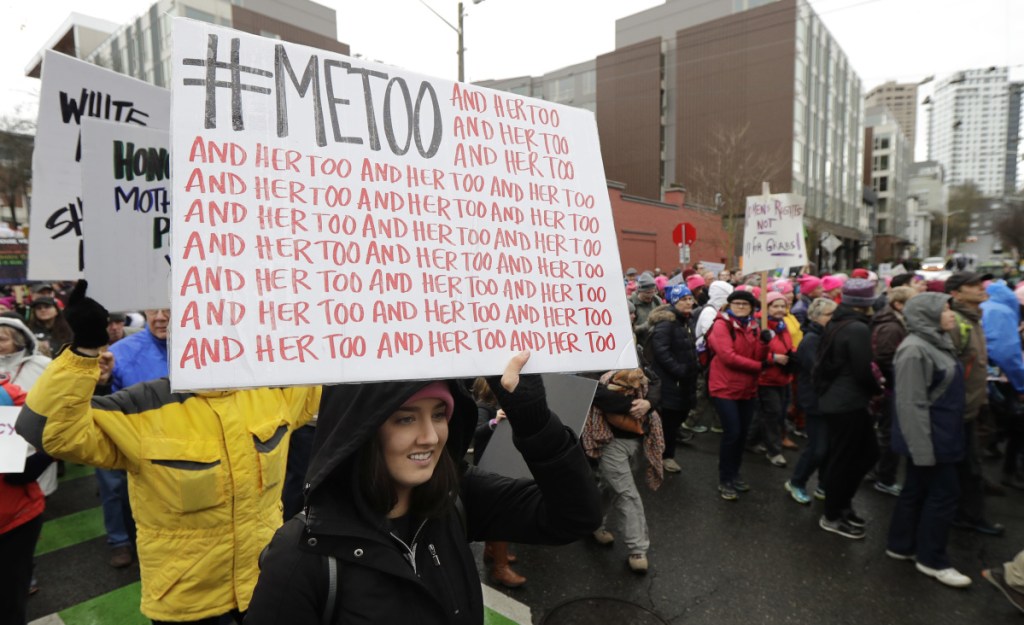The historic #MeToo movement has died down a bit, but the consequences for those accused, such as celebrities Bill Cosby and Harvey Weinstein, are still playing out in the courts and the media. What began as an expose about powerful men forcing themselves sexually upon women in the workplace blossomed into an online opportunity for women to cite all sorts of unwanted acts of sexual abuse and harassment in their lives.
As #MeToo first swept through Facebook and other channels, I read the entries but could not relate to those experiences. I honestly could not think of a moment in my working life when I felt that I had been sexually harassed, much less assaulted.
I consider myself a well-adjusted, conventional working woman, married in a monogamous relationship for 40-plus years, having had mostly male friends in high school and college (a former all-male university that had a low percentage of women). Sure — that stuff happens, but not to me.
But memories bubbled up from the past, memories that perhaps were discounted. Memories that years ago were ascribed to “just the way it was back then.” Memories that were suppressed. I realized that in today’s new awareness of sexual misdeeds, I should also say “#MeToo.”
I have three episodes from my childhood. I was a tomboy when I grew up in California — a pretty adept athlete. I mostly played with boys (girls sports in the 1960s being nothing like they are today). I loved flag football, practiced baseball with Little League teams, and played endless pickup games on the school fields.
One day, after a baseball game, I mounted my bike to leave when I was blocked by an older, tougher boy on the playground. While my good friends turned their back in embarrassment — bystanders? — the boy threatened me and made me drop my shorts as he dropped his.
Some genital touching occurred; one could almost write it off as normal childhood exploration. But it wasn’t. There was no choice on my part, and there was force and power on his. My parents and school officials certainly did not consider it normal when the word finally got out.
A second playground episode followed a spirited after-school game of foursquare. As my friend and I rounded the corner of a school building to head for home, a man appeared. He tried to convince us that he was my friend’s uncle and she should come with him. She was having none of it. He then unzipped his pants and tried to get us to touch him; we weren’t going to do that either. After multiple attempts, he finally got in his car and took off.
Imagine the police trying to get my 8-year-old self to give a description of the the man and identify the make and model of the car. The color was the best I could come up with. Needless to say, he was never caught.
Years later, I went to San Francisco with a couple of girls to ride up and down the hills on the cable cars and go to Fisherman’s Wharf. We sat on the crowded cable car, facing outside. As we chatted excitedly about the day, a large man got on at the next stop, stood on the outside step and hung on to a post. After a while, I realized he was planting his crotch on my knee, looking over my head, and bouncing. Alarmed, I moved away from him on the seat, but he shuffled over and did it again for several minutes.
I was stuck — I couldn’t get off. At the next stop I elbowed my friends and said, “Get off!”
“But why?”
“Never mind, just get off!”
When they learned what happened, we all giggled nervously, chimed “Gross!”, and hustled up and over the hills to our destination.
Seems pretty harmless, right? Almost like something out of a tasteless teen movie.
But what gives an adult, male stranger the right to corner a young girl in a public place to extract sexual gratification? Why is it up to the girl to get off the public transport — or to stop running in the park, or to stop walking on the streets at night — to end these flagrant sexual actions? Who owns public places?
Fortunately, these episodes were limited in scope and did not have any lasting impact on me. We all know that others have been subjected to worse and have paid the price in self-esteem and long-term health outcomes.
I cite these not to be sensational but to emphasize that sexual misconduct, harassment, or abuse is much more common than we want to admit. That is why women tend to believe the accusers more than men. We can learn how to prevent future #MeToo incidents in places where we work, shop, eat, and play by checking out the new website, MaineCanDo.org.
Lisa Miller, of Somerville, is a former legislator who served on the Health and Human Services and Appropriations and Financial Affairs committees.
Send questions/comments to the editors.



Success. Please wait for the page to reload. If the page does not reload within 5 seconds, please refresh the page.
Enter your email and password to access comments.
Hi, to comment on stories you must . This profile is in addition to your subscription and website login.
Already have a commenting profile? .
Invalid username/password.
Please check your email to confirm and complete your registration.
Only subscribers are eligible to post comments. Please subscribe or login first for digital access. Here’s why.
Use the form below to reset your password. When you've submitted your account email, we will send an email with a reset code.